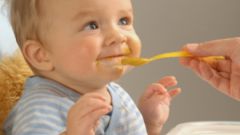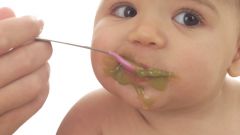Therefore, immediately after the birth, you should set the mode of feeding. Try to give him food through a precisely defined period of time 2.5-3 hours. Very soon the stomach of the baby acquires reflex rhythmically allocated juices, and the baby will get used to eating at certain times.
Mother's milk
Every mother should nurse her baby. With mother's milk the child receives not only all the necessary for its existence and growth nutrients, but also protective of the mother's body that protect it from diseases. In addition, the milk obtained directly from the breast, is sterile; it's lighter than all other food is digested and digestible child stomach.
After childbirth both mother and baby need to rest. After only 12 hours, during which the newborn is given to sweetened boiled water (5% sugar), it can be applied to the chest. Before feeding it is necessary to thoroughly wash hands with soap and water and wash the nipple, together with the pigmented part around it) with a cotton swab dipped 3% solution of boric acid. Decant a few drops of milk with them removed infiltrated into the channels of germs. If after birth, you can't feed your baby lying down, leaning forward.
Later, when your body will get stronger, you have to feed, sitting on a chair with a backrest and putting a small stool under the foot under the right, if you feed right breast and under the left, if left. With one hand hold the child, and the other to hold the breast so that it was between the second and third fingers. The mouth of a child should not only cover the nipple, but the pigment stain around it. Often the child pushes the nose to the chest and therefore can't suck in peace. Keep this from happening. It sucking cold. In this case, before feeding to the nose of the child should be drip drops. It is important to feed the baby in silence as the conversations distract him. When the baby sucks well, heard the sound of swallows.
After birth the amount of milk (colostrum) from the nurse are very small — each breast is able to separate during feeding only 10-15 grams of colostrum. This number increases after the 3rd day, reaching to the 7-th day of 700, by the end of the second month — 800, and by the end of the 5th month to 1000 grams per day. Enough milk the child receives, can be set by weighing. Weigh the baby before and after feeding at various hours of the day, because in the morning more milk and less in the evening. Checking the child's weight every week, you can add in the weight enough. If the newborn have enough milk, he gaining weight continuously — in the first 3 months, about 800 grams, then 600 grams, and by the end of the year — 500 grams per month. If you reduce the amount of milk the child urinate less often, and stool from the Golden yellow it becomes green and slimy.
Serious causes of premature weaning baby from the breast are cases of serious maternal illness — severe anemia, chronic nephritis, mental and acute infectious disease, cancer, diabetes, etc. If a nursing mother gets sick with typhus, dysentery, etc., feeding should be suspended, but take care that the milk does not disappear. For this you need to pump it regularly. After recovery mother feeding continues. If the mother contracted whooping cough, feed the baby can be specially expressed milk. With the disease of chicken pox, sore throat, catarrh of the upper respiratory tract, inflammation of the lungs of a child can be fed, while respecting the strictest hygiene. In this case, the mother should wear a mask made from four layers of gauze. The appearance of menstruation is not a reason for weaning baby from the breast. If a breastfeeding mother gets pregnant again, feeding can be continued at most up to 7-8 months. Further feeding can severely Deplete her.






